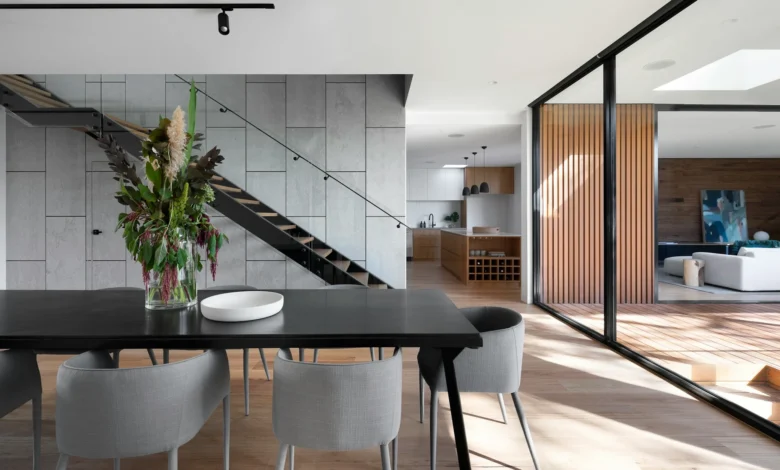
Liverpool’s Aspiring Homeowners Are Rethinking Luxury In The Northwest
For years, Liverpool was a working class city. From the 1980s until the 2000s, it experienced a severe economic decay with dock work moving elsewhere and the last of the legacy industry shutting down.
However, recent years have seen the city experience a resurgence, partly thanks to a diversifying economy, and also because of the nouveau riche coming out of nearby Manchester. The result is a new class of individuals with high aspirations, particularly when it comes to their homes.
Liverpool’s wealthier suburbs were always footballers’ wives territory, with mansions, long drives, and tree-lined streets. But the area is gaining traction beyond the sports scene, with wealthy people moving to the area just because they want to live there. Parts of the Wirral are becoming extraordinarily wealthy, with an influx of self-made millionaires looking for a pad in the economic heartland of the northwest, close to transport links and their personal networks.
As such, what it means to live a luxurious lifestyle in the region is changing. No longer is it a monoculture built on top of the working class. Instead, it’s something that’s becoming more diffuse and aspirational, as more people see the region as a potential home.
Sustainable Design
Liverpool has long been a port city, attracting international visitors looking for something new. However, that’s going up a notch as wealthy people move to the area to invest in sustainable design and features in their homes.
One particular area of interest is the use of energy-efficient appliances and eco-conscious materials. Wealthy individuals want to reduce the impact of their lifestyle but still enjoy the perks of a refrigerator that orders supplies for itself or a washing machine that relies on solar power.
Many wealthy people moving to the Liverpool area also find these trends interesting. Consumer consumption is no longer something conspicuous or done unconsciously. Instead, it now involves more research and participation as wealthy individuals try to work out the best course of action based on the science and developments in the particular field that interests them.
Green Spaces
Coupled with this notion of sustainable design is green spaces, or the idea that Liverpool should be a living, vibrant place, not just rows of endless concrete and glass structures. Therefore, many of the wealthiest people in the city are insisting on green spaces, even if that pressure on the land is high.
Part of this demand comes from the desire for outdoor living amenities, including fire pits, outdoor kitchens and relaxation zones. These are no longer a nice-to-have, but rather an essential feature for health-conscious individuals living in the area.
“The demand for furniture for outdoor spaces is shooting through the roof,” Vivify Homes explains. “People are looking for ways to enjoy warmer summers outdoors and avoid being isolated in their homes, even when the weather turns hot. There’s a growing understanding that social activities and getting outside can dramatically transform well-being and even lead to an increased rate of DNA repair.”
Craftsmanship
Liverpool homeowners believe in the value of craftsmanship and have an immense pool of talent to pull on from the surrounding area. Millions of skilled tradespeople live within thirty miles of the city, making it a hub for design and architecture in the region.
“A high level of craftsmanship runs through nearly every niche,” Vivify Home explains. “Of course, we see it most clearly in the furniture sector, but it is also visible in the landscaping and extension that people get, along with the overall quality of the interior design. There’s just no beating it outside of London.”
Part of this demand for craftsmanship comes from the desire to avoid generic designs. People living in Liverpool want high-quality finishes that reflect their personalities and status aspirations. Simply sticking with the usual ideas no longer appeals to the city’s nouveau riche and other affluent members of the community.
Tech-Integration
The technology-related side of things is also growing in Liverpool. Homeowners want to buy gadgets to improve their lifestyles.
Granted, many of these come from overseas. But for the international elite that calls the city home, that’s not a problem. Automated lighting and security are now big business in the city, with many homeowners viewing these smart touches as essentials, not just nice-to-have add-ons.
Part of this drive comes from the relatively youthful wealthy population in the city. Homeowners come from a generation that has known nothing but technology and want to see how much they can leverage it to improve their quality of life.
“It should be clear by now that infusing tech into homes is no longer a gimmick. It has been an almost silent revolution, similar to new features gradually arriving in cars. First, only a few people have them. But then over time, many more use them before it becomes commonplace almost everywhere.”
An aspect of this is involved in multi-function rooms. Homeowners looking for flexible spaces need technology to support their ambitions, particularly remote workers looking for home offices that meet their audio-visual requirements.
Having tech everywhere in a home can help with work and provide a change of environment for workers tired of working in the same office spaces. Given Liverpool’s relatively low cost of living, there’s quite a bit of demand for this.
Urban Living
Lastly, many homeowners are rethinking luxury in the northwest by choosing to live near amenities instead of out of town on sprawling estates. The idea is to be closer to the action and networking instead of having lots of connections in the inner city area.
This trend is already visible with the urban developments in Manchester. But there are also luxury apartment buildings rising in Liverpool, with the sellers saying that they are already selling units, particularly on the higher floors.







